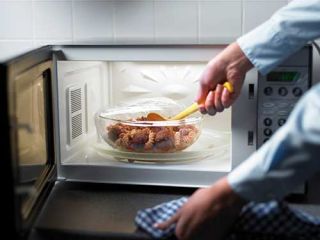Leftovers can be a lifesaver when it comes to a quick office lunch or a no-fuss evening meal. There’s something so satisfying about popping a plate of last night’s dinner in the microwave for a fast and easy way to fill your belly. Unfortunately, reheating certain dishes can put you at risk of food poisoning or worse. Here are a few foods you should never reheat for safety reasons.
LEFTOVER POTATOES
The issue with reheating potatoes is not actually the process of warming them in the microwave or oven. If cooked potatoes are left to cool at room temperature for too long, the bacteria that cause botulism may form. This is actually made more likely if the potatoes are wrapped tightly in foil.
Reheating doesn’t always get the potato hot enough to kill the bacteria, even if the dish seems piping hot. If you didn’t tuck your potatoes away in the refrigerator right after serving, don’t risk food poisoning by eating them the next day.
LEFTOVER CHICKEN
Leftover chicken can be dangerous. Though it isn’t strictly true that reheated chicken will lead to food poisoning, getting the process right is tricky. It is technically OK to reheat chicken. However, you need to make sure that every single part of the chicken has reached a temperature of at least 175 degrees Fahrenheit to ensure dangerous bacteria are killed. The only way to do that is with a cooking thermometer. Furthermore, you need to make sure cooked chicken is kept below 42 degrees Fahrenheit at all times if you plan to reheat it, and you should toss any cooked chicken that has been around for more than three days.
SEAFOODS
Seafood is always best enjoyed fresh, but is it safe to reheat? The answer depends on how the seafood was stored.
According to the FDA, fresh seafood that was caught and immediately frozen should be safe to reheat. However, fresh or cooked seafood that has spent any time at room temperature might be harboring bacteria that can cause food borne illness. Reheating may not kill these bacteria, and it can be hard to know how seafood was previously stored if you are buying it fresh.
OIL
You should use caution when reheating oily foods. Reheating oils can lead to toxic fumes. Different oils have different heat tolerances, according to Livestrong. If you heat oil past a safe level, it can produce toxic fumes.
Foods with a lot of oil shouldn’t be tossed in the microwave, as the high heat may cause the oil to smoke and produce these dangerous toxins. If you’re going to reheat it, it’s best to cook it low and slow in the oven — or not at all.
©2021. All rights protected. Florida marketing center, Florida, USA.


